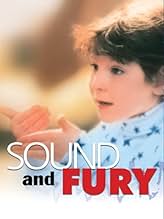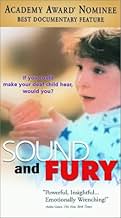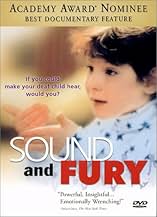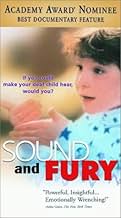अपनी भाषा में प्लॉट जोड़ेंIf you could make your deaf child hear, would you? Academy Award-nominated "Sound and Fury" follows the intimate, heart-rending tale of the Artinians, an extended family of deaf and hearing ... सभी पढ़ेंIf you could make your deaf child hear, would you? Academy Award-nominated "Sound and Fury" follows the intimate, heart-rending tale of the Artinians, an extended family of deaf and hearing members, across three generations. Together they confront a technological device that can ... सभी पढ़ेंIf you could make your deaf child hear, would you? Academy Award-nominated "Sound and Fury" follows the intimate, heart-rending tale of the Artinians, an extended family of deaf and hearing members, across three generations. Together they confront a technological device that can help the deaf to hear but may also threaten deaf culture--and their bonds with one another... सभी पढ़ें
- 1 ऑस्कर के लिए नामांकित
- 3 जीत और कुल 5 नामांकन
फ़ीचर्ड समीक्षाएं
SOUND AND FURY deals with the questions raised by the development of cochlear implants which can restore hearing for those with congenital deafness. Very few (if any) people in the hearing world would think this to be a bad thing, but within the deaf community some see this as encroaching technology which will eventually obliterate deaf culture and sign language.
This is one of the best documentaries I've seen in some time - partly because it really made me think (reminding me of the statement 'If you make people think they're thinking - they'll love you. If you *really* make them think, they'll hate you.')
I didn't feel hate - but I experienced some very strong emotions. Not nearly as much as those on screen, though. I was exposed to a situation in which I didn't think there could be more than one side - and was brought to the realization that there was. A very provocative film.
There was a forum after the screening of the film I attended with Josh Aronson (the director), a local pediatric surgeon who's done a number of implants, the mother of a young girl who'd had an implant operation by this surgeon, and a person from the Theatre for the Deaf in the area. I was best able to appreciate the feeling of some of those in the deaf community when the theatre director made an analogy to the Borg in STAR TREK (I paraphrase): A lot of people in the deaf community see cochlear implants like the Borg - instead of going through the eye, the implants go through the skull by the ear. It seems like hearing society is saying to the deaf society "You will be assimilated - resistance is futile."
How important is deaf culture? Whose responsibility is it to choose whether a child should get an implant? To delay and "let the child make the choice later" can very much be like choosing no, as the window for brain plasticity for language narrows with every passing year. Are parents who don't get an implant for their child, thereby keeping them in the deaf community "abusive"?
An interesting film raising intriguing questions.
Like another reviewer noted, I found myself getting a little emotional at the end. In fact, throughout the movie I was emotionally involved with a subject matter I would never thought I would.
I was struck by the elitist nature of a certain element of the deaf community. Many of the deaf people in the film were extremely antagonistic toward anything that would remove deafness or a deaf person from their community. While this is understandable, I found it extremely selfish. Not only were many in complete denial that deafness inhibited their quality of life whatsoever (are we still allowed to use the word handicapped???), some considered it superior to the "hearing world." I noted with irony that many of the deaf family members at the picnic who were so repulsed by the idea of a cocklear implant were wearing glasses; obviously they considered being born with or having deteriorating eyesight something in need of fixing. Their attitude reminded me of other defensive groups such as un(der)educated parents (hey, I did OK, why does my son need to go to college) or racial minorities (oh, you just want to make her "white").
Even without the controversial subject of the cocklear implant this is a great study in generations as it is the old story of parents either wanting their kids (adult kids) wanting them to either be like them or to have it better than they had it.
The hearing parents want a cochlear implant for their deaf baby, angering and alienating the deaf relatives who see the operation as a threat to deaf culture. The even more complex story is that of the 5 year old deaf daughter of the deaf parents. The little girl wants the implant, and that creates an awful emotional dilemma for the parents who have to question whether denying their daughter the operation is the right thing to do.
There are a few minor annoyances. The families try to act like the camera isn't there, but it clearly is awkwardly affecting their behavior. Also, I wish the film had subtitled the sign language, rather than having less-than-great actors give their own inflection and emotional interpretation to what's being said, which may or may not be accurate.
But these are minor problems for a film that tackles a complex issue with intelligence and even-handedness.
क्या आपको पता है
- गूफ़When Peter asks Nancy (the girl with the cochlear implant from the deaf family) if she socializes more with deaf or hearing, the voice-over says, "Mostly deaf people." However, she is actually signing, "Grandma and grandpa."
- इसके अलावा अन्य वर्जनA 60-minute version of this film is available from the Filmaker's Library.
टॉप पसंद
- How long is Sound and Fury?Alexa द्वारा संचालित
विवरण
- रिलीज़ की तारीख़
- कंट्री ऑफ़ ओरिजिन
- आधिकारिक साइट
- भाषाएं
- इस रूप में भी जाना जाता है
- Звук и ярость
- उत्पादन कंपनियां
- IMDbPro पर और कंपनी क्रेडिट देखें
बॉक्स ऑफ़िस
- US और कनाडा में सकल
- $1,14,882
- US और कनाडा में पहले सप्ताह में कुल कमाई
- $7,104
- 29 अक्टू॰ 2000
- दुनिया भर में सकल
- $1,14,882
- चलने की अवधि
- 1 घं 20 मि(80 min)
- रंग
- ध्वनि मिश्रण
- पक्ष अनुपात
- 1.33 : 1


















